
The National Science Bowl (NSB) is a high school and middle school science knowledge competition, using a quiz bowl format, held in the United States. A buzzer system similar to those seen on popular television game shows is used to signal an answer. The competition has been organized and sponsored by the United States Department of Energy since its inception in 1991.

Beat the Geeks is an American television game show that aired on Comedy Central from 2001 to 2002. The show was rerun on The Comedy Network in Canada.
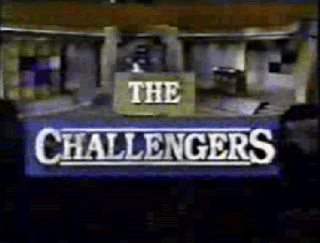
The Challengers is an American game show that aired in syndication during the 1990-91 television season The series was created by Ron Greenberg and was based largely on his 1969 production, The Who, What, or Where Game. Dick Clark presided over the show with Don Morrow announcing. The Challengers was a joint production of Ron Greenberg Productions and Dick Clark Productions, with Buena Vista Television as distributor.
Idiot Savants is an American television game show on the MTV network which ran from December 9, 1996, to April 25, 1997. It was created by Michael Dugan and Chris Kreski, directed by Steve Paley, and hosted by comedian Greg Fitzsimmons.
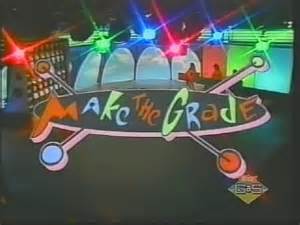
Make the Grade is a children's game show that aired from October 2, 1989, to September 14, 1990, on Nickelodeon.
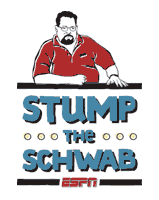
Stump the Schwab is an American game show that aired on ESPN2 and ESPN Classic from July 8, 2004 to September 29, 2006. The show featured three contestants trying to defeat Howie Schwab, ESPN's first statistician, in a sports trivia contest. Stuart Scott was the show's host. The show also appeared on Canada's The Score Television Network.

Debt is an American game show hosted by Wink Martindale which aired on Lifetime from June 3, 1996, to August 14, 1998. It was produced by Buena Vista Television, a part of The Walt Disney Company. The show featured contestants who were trying to earn money to get out of debt. It had a similar format to Jeopardy!, on which contestants answered trivia. However, it targeted a younger audience and placed a larger emphasis on popular culture.
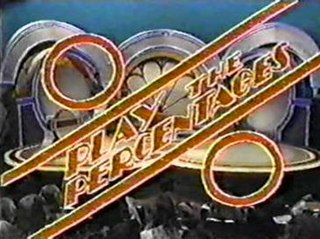
Play the Percentages is an American game show hosted by Geoff Edwards which aired in syndication from January 7 to September 12, 1980. Jay Stewart announced for the first six weeks, after which Bob Hilton became the permanent announcer.
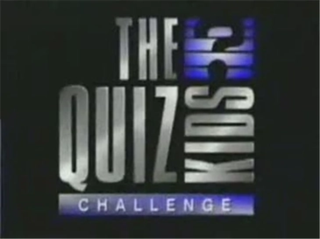
The Quiz Kids Challenge is an American television game show that was based loosely on prior Quiz Kids programs of the past, which involved schoolchildren trying to answer questions posed to them by various adults.
WinTuition is an American game show created as an original series for Game Show Network, on which it originally ran from December 9, 2002 to April 1, 2003, with repeats until January 4, 2004. The game had a school-oriented theme in which three contestants competed to answer questions on general school-based subjects in an attempt to win a $50,000 college fund, hence the name of the show. The show was hosted by Marc Summers and announced by Burton Richardson. Henry Winkler served as the show's executive producer.
My Generation is a game show on VH1 that was hosted by comedian Craig Shoemaker and announced by Lindsay Stoddart. Its 48 episodes aired for a brief period in 1998, and due to its similar format and emphasis on music, is considered to be a semi-revival of the 1969 ABC series The Generation Gap.
Animal Planet Zooventure is an American children's television game show which originally broadcast on Animal Planet and Discovery Channel from March 31, 1997 to 2000. The show was taped at the San Diego Zoo, and was hosted by J. D. Roth. In the show, four child contestants competed in a series of animal-themed stunts for the grand prize, which is to be a zookeeper for a day.
Pick Your Brain is an American syndicated game show that featured children as contestants. The series ran on weekends for one year, debuting on September 18, 1993 and running until May 21, 1994. Pick Your Brain was created by Marc Summers, who also served as its host and executive producer. He was assisted by a giant robot named 2-XL, based on the Tiger Electronics toy of the same name and voiced by Greg Berg.
The Reel Game is an American game show that aired on Monday nights on ABC from January 18 to May 3, 1971. The series was hosted by Jack Barry and announced by Jack Clark.

You Don't Know Jack was an American game show based on the video game series of the same name which aired on ABC in 2001. Paul Reubens played host Troy Stevens. Tom Gottlieb reprised his role as Cookie Masterson, who was the announcer. The show lasted six episodes.
Rumor Has It is an American daily game show that aired on the cable channel VH1 from June 7 to October 28, 1993. Brian O'Connor was the host and John Ten Eyck announced.
Stake Out was a British game show which originally aired on Challenge between 12 November and 21 December 2001. It was hosted by Anthony Davis in which contestants each bring £250 in cash, competing against each other in the hope of raising it up to £25,000.
On the Spot is an American game show produced by and broadcast on KGW-TV in Portland, Oregon as a daily series from September 1984 to October 1988. Newscaster Larry Blackmar was host, while local disc-jockey Michael Bailey announced.
Sex Wars was an American television game show that pitted two teams, one consisting of men and one consisting of women, against each other; hence, the show's name was derived from that.
Winning Combination is a British game show that aired on ITV from 16 November 2020 to 5 November 2021, hosted by Omid Djalili.








